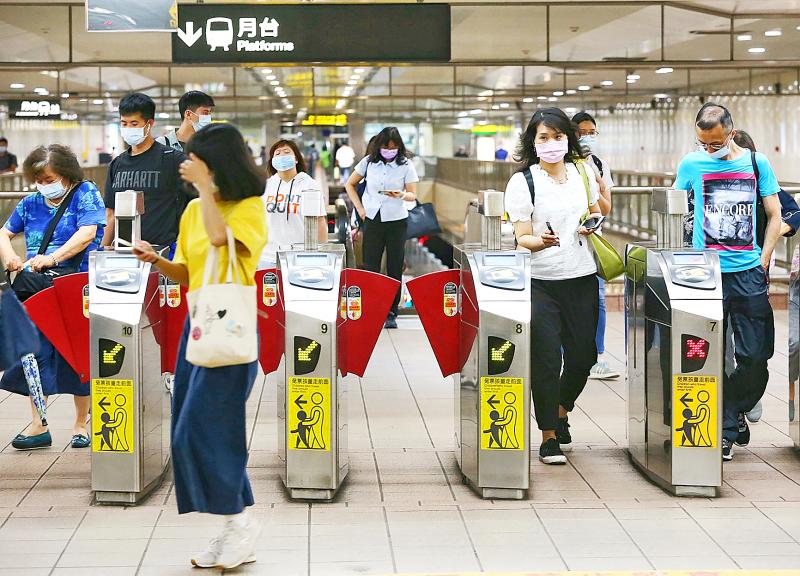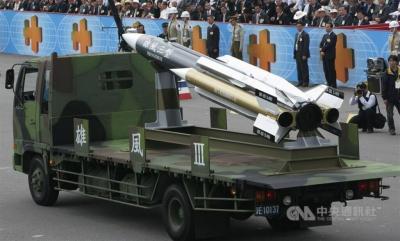Public commuters are to observe stricter disease prevention guidelines from now until June 8 after the Central Epidemic Command Center raised the alert level for COVID-19 following an increase in local cases, the Ministry of Transportation and Communications said yesterday.
With the CECC reporting six local COVID-19 cases with unknown sources of infection, Minister of Transportation and Communications Wang Kwo-tsai (王國材) said that airplane, ship, highway bus and train passengers are in general banned from eating and drinking onboard.
If they have to drink water, take medication or breastfeed their children, they can take off their mask and put it back on as soon as they finish, he told a news conference in Taipei.

Photo: CNA
However, tourism train, cruise ship and international flight passengers can temporarily take off their masks to eat if they are able to observe social-distancing guidelines or there are partitions separating them, he added.
People visiting post offices are banned from eating or drinking inside the premises, he said.
Starting on Saturday, Taiwan Railways Administration’s intercity train services and Taiwan High-Speed Rail Corp would stop selling standing-room tickets or tickets without reserved seats, Wang said, adding that all railway stations are prohibited from leasing them to the private sector to host activities until after June 8.
Large outdoor events in scenic areas and amusement parks are limited to 500 participants, per the CECC’s instructions, he said.
Disinfection would be conducted more frequently in railway stations, bus depots, freeway rest areas, tourist attractions, and airport and seaport terminals, he said.
As for CECC’s “down to zero” plan to address a cluster infection at Novotel Taipei Taoyuan International Airport hotel, China Airlines and Accor — the French hospitality company that the airline recruited to manage the transit hotel — have reached an agreement that the hotel would have both Hall 1 and Hall 2 designated as quarantine facilities, Deputy Minister of Transportation and Communications Chi Wen-chung (祁文中) said.
While the hotel only has Hall 2 certified as a quarantine hotel by the Taoyuan City Government, it had also used Hall 1 — which should only have hosted host general tourists — to accommodate China Airlines pilots and flight attendants, which was against disease prevention regulations, a CECC investigation found.
The hotel is scheduled to reopen in the second half of next month, with the two halls switching to certified quarantine facilities, Chi said.
With 500 rooms, the reopened Novotel hotel would not have enough rooms to meet the demand of China Airlines, which needs 600 to 800 rooms to accommodate its flight and cabin crew, Chi said, adding that the airline would have other quarantine facilities to host pilots and flight attendants.
For foreign pilots who need to transit through Taiwan, the CECC would find other quarantine hotels to host them, he said.
“In the past, the Civil Aeronautics Administration [CAA] was solely responsible for managing pilots and flight attendants under quarantine. Now, we will send their information to the house registration system as well, marking them as flight and cabin crew,” Chi said.
The “down to zero” plan, which requires the airline’s pilots and flight attendants to take turns undergoing a 14-day quarantine, would reduce its transport capacity by only 20 percent, Wang said.
To enforce the plan, the airline’s pilots and flight attendants would be divided into safe and high-risk groups, the CAA said.
The safe group would comprise flight and cabin crew who have completed 14 days of quarantine and can enter local communities or be dispatched for flight assignments, it said.
The high-risk group would be flight and cabin crew currently on assignment. Once they finish their job and complete quarantine, they would be moved to the safe group.
Members of the two groups must not have contact with each other and must not be allowed to take flight assignments together, the CAA said.

STATS: Taiwan’s average life expectancy of 80.77 years was lower than that of Japan, Singapore and South Korea, but higher than in China, Malaysia and Indonesia Taiwan’s average life expectancy last year increased to 80.77 years, but was still not back to its pre-COVID-19 pandemic peak of 81.32 years in 2020, the Ministry of the Interior said yesterday. The average life expectancy last year increased the 0.54 years from 2023, the ministry said in a statement. For men and women, the average life expectancy last year was 77.42 years and 84.30 years respectively, up 0.48 years and 0.56 years from the previous year. Taiwan’s average life expectancy peaked at 81.32 years in 2020, as the nation was relatively unaffected by the pandemic that year. The metric

Taiwan High Speed Rail Corp. (THSRC) plans to ease strained capacity during peak hours by introducing new fare rules restricting passengers traveling without reserved seats in 2026, company Chairman Shih Che (史哲) said Wednesday. THSRC needs to tackle its capacity issue because there have been several occasions where passengers holding tickets with reserved seats did not make it onto their train in stations packed with individuals traveling without a reserved seat, Shih told reporters in a joint interview in Taipei. Non-reserved seats allow travelers maximum flexibility, but it has led to issues relating to quality of service and safety concerns, especially during

A magnitude 5.1 earthquake struck Chiayi County at 4:37pm today, the Central Weather Administration (CWA) said. The hypocenter was 36.3km southeast of Chiayi County Hall at a depth of 10.4km, CWA data showed. There were no immediate reports of damage resulting from the quake. The intensity of the quake, which gauges the actual effect of a seismic event, measured 4 in Chiayi County, Tainan and Kaohsiung on Taiwan's seven-tier intensity scale, the data showed. The quake had an intensity of 3 in Chiayi City and Yunlin County, while it was measured as 2 in Pingtung, Taitung, Hualien, Changhua, Nantou and Penghu counties, the data

The Supreme Court today rejected an appeal filed by former Air Force officer Shih Chun-cheng (史濬程), convicted of Chinese Communist Party (CCP) espionage, finalizing his sentence at two years and two months for contravening the National Security Act (國家安全法). His other ruling, a ten-month sentence for an additional contravention, was meanwhile overturned and sent to the Taichung branch of the High Court for retrial, the Supreme Court said today. Prosecutors have been notified as Shih is considered a flight risk. Shih was recruited by Chinese Communist Party (CCP) intelligence officials after his retirement in 2008 and appointed as a supervisor